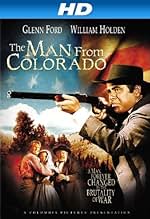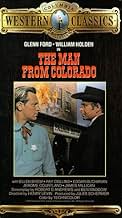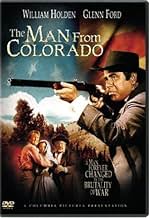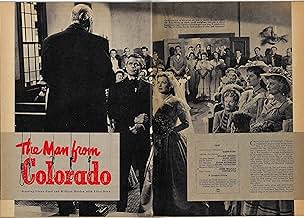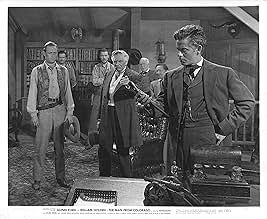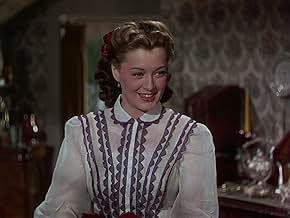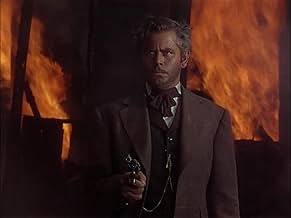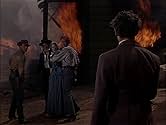IMDb RATING
6.6/10
2.1K
YOUR RATING
At the end of the Civil War, two friends return home to Colorado and one of them has changed and is violent and erratic.At the end of the Civil War, two friends return home to Colorado and one of them has changed and is violent and erratic.At the end of the Civil War, two friends return home to Colorado and one of them has changed and is violent and erratic.
- Director
- Writers
- Stars
- Awards
- 1 nomination total
William 'Bill' Phillips
- York
- (as Wm. 'Bill' Phillips)
Stanley Andrews
- Roger MacDonald
- (uncredited)
Emile Avery
- Townsman
- (uncredited)
Walter Bacon
- Townsman
- (uncredited)
Walter Baldwin
- Tom Barton
- (uncredited)
Symona Boniface
- Matron
- (uncredited)
Chet Brandenburg
- Party Guest
- (uncredited)
James Bush
- Cpl. Dixon
- (uncredited)
Nora Bush
- Townswoman
- (uncredited)
Boyd Cabeen
- Townsman
- (uncredited)
- Director
- Writers
- All cast & crew
- Production, box office & more at IMDbPro
Featured reviews
It begins at the end of the Civil War when a coward massacre takes place , fdealing with two Civil War vets at odds , as two friends return home to Colorado , one an honest marshall (William Holden) , the other a sadistic judge (Glenn Ford) has changed and is now violent and erratic. As two friends go their separate ways after Civil War , one leads an upright life as a sheriff , but the other corrupted by the war engages in a violent campaign to build his own law , and carrying out terrorisation . Colorado's wasn't big enough for both .. when a moan came between them ! .They Turned the West Into a Jungle of Male Killing Male for a Woman!
An odd , old but solid Technicolor Western fare about two friends return home after their discharge from the army after the Civil War , but one of them becomes an erratic , disturbing judge with quirky acting by Glenn Ford , while his friend decently acted by William Holden who desperately tries to find a way to help him. It begins as a sluggish , slow-moving Western with long ball scenes but follows to surprise us with complex characters , thrills , breathtaking patches and decent plot about two different friends ; as both of them end up on opposite sides of the law . The simple tale is almost rudimentary though full of clichés , as the engaging script lines too often settle for crude routine , at times . Suspense and tension builds over the time in which the outlaws and the starring await to take the final confrontation . The action is competently made , as when the nasties shoot and hang without remission and even fire a village . The highlights of the film are the scenes in which the strict judge exects his particular justice by hanging and the final facing off . William Holden provides a slighly laborious acting as new Marshal , but his interpretation is really eclipsed by the great Glenn Ford has had deep-rooted psychological damage due to his experiences during the war, and as his behavior becomes more and more insane . They're well accompanied by a good support cast , such as : Ray Collins , Edgar Buchanan , Jerome Courtland , James Millican, Stanley Andrews , among others .
The motion picture was well directed by Henry Levin . Ex-actor ,director Henry Levin was a previous stage player who had a prolific and long career as filmmaker entering the directing in 1943 about every genre over the next 36 years . His heyday was in the 1960s , when he turned out several bright and frothy sex comedies, notably ¨Belles on their toes , Come fly with me , Honeymoon hotel¨ , his greatest films were on the adventure genre as ¨Genghis Khan , The wonderful world of Brothers Grimm , The bandit of Sherwood Forest , The return of Monte Cristo and Journey to the center of the earth¨ . Although Levin's forte was light comedies, one of his most interesting films was a dark, brooding western ¨Lonely man¨ (1957) and ¨Desperados¨ , both of them with Jack Palance. He finished his career piloting made-for-television movies, and died on the final day of shooting Scout's Honor (1980) (TV). If you are looking for Westerns with action , violence but also story and atmospheric scenes The Man from Colorado(1948) should be for you.
An odd , old but solid Technicolor Western fare about two friends return home after their discharge from the army after the Civil War , but one of them becomes an erratic , disturbing judge with quirky acting by Glenn Ford , while his friend decently acted by William Holden who desperately tries to find a way to help him. It begins as a sluggish , slow-moving Western with long ball scenes but follows to surprise us with complex characters , thrills , breathtaking patches and decent plot about two different friends ; as both of them end up on opposite sides of the law . The simple tale is almost rudimentary though full of clichés , as the engaging script lines too often settle for crude routine , at times . Suspense and tension builds over the time in which the outlaws and the starring await to take the final confrontation . The action is competently made , as when the nasties shoot and hang without remission and even fire a village . The highlights of the film are the scenes in which the strict judge exects his particular justice by hanging and the final facing off . William Holden provides a slighly laborious acting as new Marshal , but his interpretation is really eclipsed by the great Glenn Ford has had deep-rooted psychological damage due to his experiences during the war, and as his behavior becomes more and more insane . They're well accompanied by a good support cast , such as : Ray Collins , Edgar Buchanan , Jerome Courtland , James Millican, Stanley Andrews , among others .
The motion picture was well directed by Henry Levin . Ex-actor ,director Henry Levin was a previous stage player who had a prolific and long career as filmmaker entering the directing in 1943 about every genre over the next 36 years . His heyday was in the 1960s , when he turned out several bright and frothy sex comedies, notably ¨Belles on their toes , Come fly with me , Honeymoon hotel¨ , his greatest films were on the adventure genre as ¨Genghis Khan , The wonderful world of Brothers Grimm , The bandit of Sherwood Forest , The return of Monte Cristo and Journey to the center of the earth¨ . Although Levin's forte was light comedies, one of his most interesting films was a dark, brooding western ¨Lonely man¨ (1957) and ¨Desperados¨ , both of them with Jack Palance. He finished his career piloting made-for-television movies, and died on the final day of shooting Scout's Honor (1980) (TV). If you are looking for Westerns with action , violence but also story and atmospheric scenes The Man from Colorado(1948) should be for you.
One of several morose postwar westerns addressing the untidy aftermath of the Civil War, incongruously shot in pristine Technicolor; all the better, presumably, for Columbia to showcase it's fresh young stars. Glen Ford and Bill Holden.
Ford - giving the strangest performance he probably ever gave as the psychotic sheriff - was in reality two years older than Holden; but the grey-templed hairpiece Ford wears (either to make him look older or to show the toll the war has taken on him) actually makes him look even younger.
Ford - giving the strangest performance he probably ever gave as the psychotic sheriff - was in reality two years older than Holden; but the grey-templed hairpiece Ford wears (either to make him look older or to show the toll the war has taken on him) actually makes him look even younger.
Glenn Ford was as good as anyone playing an intense psychotic, which he does here in this above-average western. Ford, playing "Col.Owen Devereaux," gets elected to the position of "judge" right after his distinguished career in the Civil War. Unfortunately, he has mental problems and this position carries too much weight for an unstable sort such as him to be carrying. His best buddy, "Capt. Del Stewart" (William Holden) sees his friend as he is and tries to reason with him and help him out but winds up being alienated, too, by the paranoid judge whose problems escalate as the story goes on.
There's not a tremendous amount of action in here, but it still moves pretty fast and looks really nice on DVD. This is one of the few color films of the 1940s.
Ellen Drew, Ray Collins and Ed Buchnan provide good supporting help in the story. If you like some of the Anthony Mann-James Stewart westerns of the late '40s/early '50s, you should like this one, too.
There's not a tremendous amount of action in here, but it still moves pretty fast and looks really nice on DVD. This is one of the few color films of the 1940s.
Ellen Drew, Ray Collins and Ed Buchnan provide good supporting help in the story. If you like some of the Anthony Mann-James Stewart westerns of the late '40s/early '50s, you should like this one, too.
The story is a fairly simple one. Col. Glenn Ford and Capt. Bill Holden return with a group of fellow soldiers to their home town after the Civil War has ended. Ford has been a pretty ruthless officer. The town has changed during their three-year absence. Their only source of livelihood were their gold claims, but federal laws converted those claims to private property and the mines were gobbled up by Big Ray Collins.
Collins backs Ford for the post of federal judge, and Ford appoints his best friend Holden as chief lawman. The disappointed ex-soldiers bring their case to Judge Ford who finds in favor of Collins. Judge Ford also marries the girl, Ellen Drew, whom Holden also loves. Well, frankly, the ex-soldiers are thoroughly browned off at the loss of their claims even though Big Ray gives them jobs at a barely livable wage ("digging out our own gold") before firing them. Some of the men become bandits preying on Collins' gold. Some don't. But all of them grow to hate Judge Ford for upholding the law, even coming to his house during a birthday party and insulting him in front of his wife and his guest, the friendly doctor, Ed Buchanan. "I don't blame [Collins]," shouts one of the angry crowd, "I blame you!" Ford throws them out.
The plot gets too complicated to describe in any detail but it can be summed up by saying that Judge Ford slugs Holden for telling him he's "sick inside" (people tell Judge Ford that he's "crazy" so often in this movie that it's no wonder he doesn't believe it). His punishments, while within the law, become outrageous. It isn't so much that he's on the side of Big Ray and the suits. It's that he's on his own trip. The movie ends happily, more or less, with Ford gone and Big Ray destroyed, and Holden riding off to Washington to see that the ex-soldiers and the rest of the town get their just due. He smiles at Allen as he boards the train and tells her, "I'll be back."
It's been pointed out repeatedly that "adult westerns" -- that is, those appearing after everybody started watching cheap Hopalong Cassidy movies on TV -- are a chronicle of their times. {"High Noon" is the most often cited example, although nobody seems quite sure of exactly which point of view the film took.) "The Man from Colorado" is no exception. Released in 1948, it's full of references to war veterans and the problems they experience after returning to their home towns. And Glenn Ford has clearly been twisted by his wartime experiences, as have some character in other late- or post-war movies -- William Bendix in "The Blue Dahlia" or whatever it's called, who keeps hearing "monkey music" in his head, or John Garfield in "Pride of the Marines," or Brian Keith in "Five Against the House," I think it was.
The topical references are the most interesting part of the movie, but they are grafted onto an otherwise routine plot. The movie is overorchestrated. If the characters sang their lines it would be grand opera. The wardrobe is undistinguished. The settings are cheesy. When an unjustly accused young veteran is lying against the wall of his jail cell, it looks like what it is: a plaster wall with bricks painted on it. But Makeup should get a medal. Glenn Ford has worn various dos during his career, from bookeeper to flat-top but nothing like this pompador.
Watch it if nothing else is on.
Collins backs Ford for the post of federal judge, and Ford appoints his best friend Holden as chief lawman. The disappointed ex-soldiers bring their case to Judge Ford who finds in favor of Collins. Judge Ford also marries the girl, Ellen Drew, whom Holden also loves. Well, frankly, the ex-soldiers are thoroughly browned off at the loss of their claims even though Big Ray gives them jobs at a barely livable wage ("digging out our own gold") before firing them. Some of the men become bandits preying on Collins' gold. Some don't. But all of them grow to hate Judge Ford for upholding the law, even coming to his house during a birthday party and insulting him in front of his wife and his guest, the friendly doctor, Ed Buchanan. "I don't blame [Collins]," shouts one of the angry crowd, "I blame you!" Ford throws them out.
The plot gets too complicated to describe in any detail but it can be summed up by saying that Judge Ford slugs Holden for telling him he's "sick inside" (people tell Judge Ford that he's "crazy" so often in this movie that it's no wonder he doesn't believe it). His punishments, while within the law, become outrageous. It isn't so much that he's on the side of Big Ray and the suits. It's that he's on his own trip. The movie ends happily, more or less, with Ford gone and Big Ray destroyed, and Holden riding off to Washington to see that the ex-soldiers and the rest of the town get their just due. He smiles at Allen as he boards the train and tells her, "I'll be back."
It's been pointed out repeatedly that "adult westerns" -- that is, those appearing after everybody started watching cheap Hopalong Cassidy movies on TV -- are a chronicle of their times. {"High Noon" is the most often cited example, although nobody seems quite sure of exactly which point of view the film took.) "The Man from Colorado" is no exception. Released in 1948, it's full of references to war veterans and the problems they experience after returning to their home towns. And Glenn Ford has clearly been twisted by his wartime experiences, as have some character in other late- or post-war movies -- William Bendix in "The Blue Dahlia" or whatever it's called, who keeps hearing "monkey music" in his head, or John Garfield in "Pride of the Marines," or Brian Keith in "Five Against the House," I think it was.
The topical references are the most interesting part of the movie, but they are grafted onto an otherwise routine plot. The movie is overorchestrated. If the characters sang their lines it would be grand opera. The wardrobe is undistinguished. The settings are cheesy. When an unjustly accused young veteran is lying against the wall of his jail cell, it looks like what it is: a plaster wall with bricks painted on it. But Makeup should get a medal. Glenn Ford has worn various dos during his career, from bookeeper to flat-top but nothing like this pompador.
Watch it if nothing else is on.
"The Man From Colorado" opens in the closing days of the American Civil War. Two life long friends, Col. Owen Deveraux (Glenn Ford) and Capt. Del Stewart (William Holden) along with their troop corner a group of tired, poorly armed Confederate soldiers. They raise a white flag of surrender but Deveraux refuses to acknowledge it (unknown to the others) and orders his troops to open fire. The Confederates are all killed except for one officer.
Stewart senses that his friend is becoming psychotic but attributes it to the pressures of war. Later they return to their home town and are given a heroes welcome. The surviving Confederate officer confronts Deveraux who shoots him down with a wild look in his eyes. Meanwhile, big time mine boss Ed Carter (Ray Collins) and the Governor's representative (Stanley Andrews) offer Deveraux the position of Federal Judge. He accepts and appoints Stewart as Federal Marshal.
Most of Deveraux's troops had gold mining claims prior to going off to war. During their three year absence Carter has through a legal loophole, taken over their claims. Judge Deveraux is forced to side with Carter. This causes some of the men led by Jericho Howard (James Millican) to take to the hills and rob Carter's mining company, stealing the gold they believe to be rightfully theirs.
Jericho's kid brother Johnny (Jerome Courtland) is found with a bag of gold following a robbery during which a man was killed. Deveraux under pressure to produce the guilty parties, orders him jailed. Stewart believes in the boy's innocence and sets out to find Jericho in order to prove it. During Stewart's absence Deveraux holds a speedy trial and hangs Johnny. When Del returns he is appalled and turns in his badge and joins Jericho and his gang. This leads to further robberies until the inevitable confrontation between the two men where.............
Glenn Ford playing against type, gives one of the best performances of his career as the psychotic Deveraux. His facial expressions of increasing madness are terrifying. Holden does his best in effectively what is a supporting role, as the good friend. Ellen Drew appears as the woman both men love but who marries Deveraux only to experience first hand, his increasing madness.
Also in the cast are Edgar Buchanan as Doc Merriam, Jim Bannon as Carter's henchman Nagel and western regulars Ian MacDonald, Myron Healey, Denver Pyle and Ray Teal in other roles.
Worth a look just to catch Ford's performance.
Stewart senses that his friend is becoming psychotic but attributes it to the pressures of war. Later they return to their home town and are given a heroes welcome. The surviving Confederate officer confronts Deveraux who shoots him down with a wild look in his eyes. Meanwhile, big time mine boss Ed Carter (Ray Collins) and the Governor's representative (Stanley Andrews) offer Deveraux the position of Federal Judge. He accepts and appoints Stewart as Federal Marshal.
Most of Deveraux's troops had gold mining claims prior to going off to war. During their three year absence Carter has through a legal loophole, taken over their claims. Judge Deveraux is forced to side with Carter. This causes some of the men led by Jericho Howard (James Millican) to take to the hills and rob Carter's mining company, stealing the gold they believe to be rightfully theirs.
Jericho's kid brother Johnny (Jerome Courtland) is found with a bag of gold following a robbery during which a man was killed. Deveraux under pressure to produce the guilty parties, orders him jailed. Stewart believes in the boy's innocence and sets out to find Jericho in order to prove it. During Stewart's absence Deveraux holds a speedy trial and hangs Johnny. When Del returns he is appalled and turns in his badge and joins Jericho and his gang. This leads to further robberies until the inevitable confrontation between the two men where.............
Glenn Ford playing against type, gives one of the best performances of his career as the psychotic Deveraux. His facial expressions of increasing madness are terrifying. Holden does his best in effectively what is a supporting role, as the good friend. Ellen Drew appears as the woman both men love but who marries Deveraux only to experience first hand, his increasing madness.
Also in the cast are Edgar Buchanan as Doc Merriam, Jim Bannon as Carter's henchman Nagel and western regulars Ian MacDonald, Myron Healey, Denver Pyle and Ray Teal in other roles.
Worth a look just to catch Ford's performance.
Did you know
- TriviaColumbia Pictures spent quite a bit on The Man in Colorado. At one point, the crew dynamited the side of a 1500-foot mountain in California's San Fernando Valley in order to create a deep gorge as called for by the script. And the western town they constructed was one of the largest location sets ever built by Columbia up to that time. During filming of a massive fire scene at the end, however, the set caught fire uncontrollably, and Holden and Ford tried to actually fight the fire until firemen could arrive. "Dad came away coated in black soot, with burns to his arms and hands," Ford's son Peter later wrote.
- GoofsMany of the men are wearing trousers with belt loops and belts. Belt loops were not added to men's trousers until the 20th century.
- Quotes
Owen Devereaux: [voiceover as he writes in his diary] I killed a hundred men today. I didn't want to. I couldn't help myself. What's wrong with me? I'm afraid... afraid I'm going crazy.
- Crazy creditsOpening credits are listed in the pages of a book being turned by a hand.
- ConnectionsFeatured in Brave Warrior (1952)
- SoundtracksWhen Johnny Comes Marching Home
(uncredited)
Written by Louis Lambert (pseudonym for Patrick Sarsfield Gilmore)
Played at the homecoming
- How long is The Man from Colorado?Powered by Alexa
Details
Box office
- Budget
- $1,000,000 (estimated)
- Runtime
- 1h 40m(100 min)
- Color
- Aspect ratio
- 1.37 : 1
Contribute to this page
Suggest an edit or add missing content


